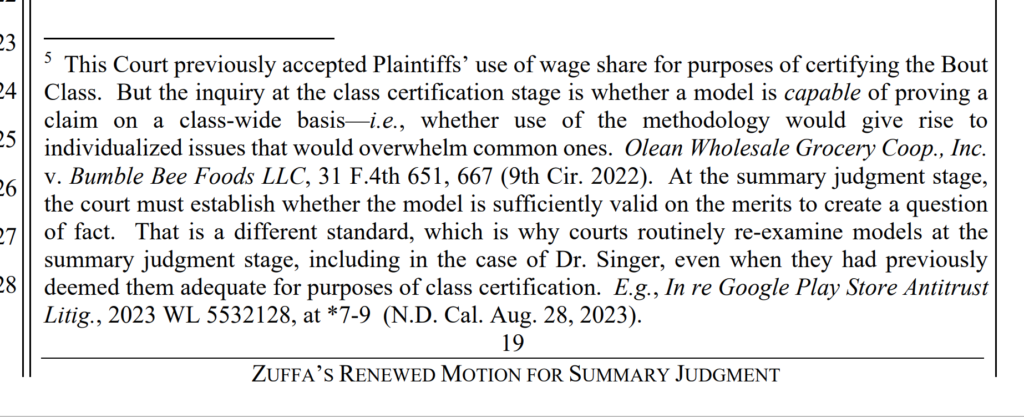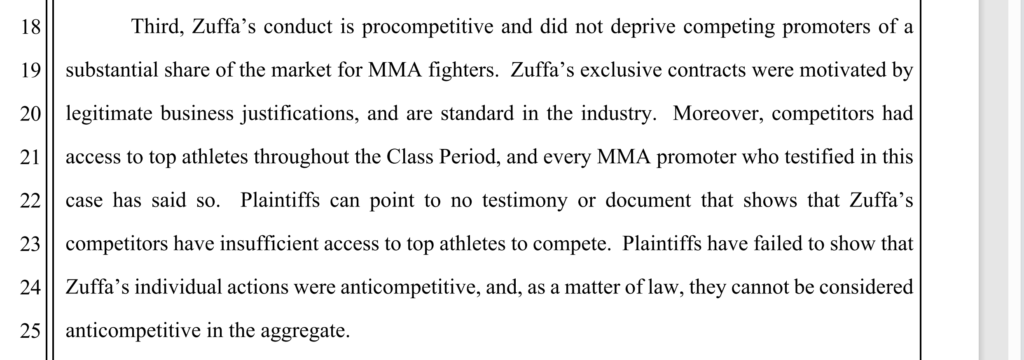The UFC has renewed its summary judgment motion in the Le antitrust lawsuit. Among the issues is the claim that it does not have monopsony power, its competitors claimed that the UFC did not use anti-competitive means to obtain market power and that some of the class members lack standing since they cannot prove they were injured by the conduct.
In addition, it filed a motion to reopen pretrial discovery which would delay the tentative trial date of April 2024 assuming the Ninth Circuit doesn’t take the case.
Due to the lift on previously sealed documents, the public could view several promotional contracts including Khabib Nurmogomedov and a Bellator Promotional Contract.
First, Zuffa argues that it had no monopsony power. Rather, it increased output.

Essentially, its argument was that while the UFC expanded, so did the industry and the market for elite fighters. It notes that it is “inconsistent with a firm restricting output in order to drive down wages.” Zuffa claims that Plaintiffs argument is that the UFC “could have expanded output even further that it did.” It also argues that it paid “higher compensation to its athletes than its competitors.”
This portion of its brief it picks apart at Dr. Singer’s “wage share” analysis as an effect on fighter pay. In doing so, it quotes its own expert stating, “The wage share analysis is incapable of showing whether wages are below the competitive level and does not constitute direct evidence of monopsony power.”
Secondly, it claims that there were no barriers to enter the marketplace. It also argues that the market for elite fighters is competitive and pays fighters the most out of all of the promotions. However, it also points out occasions where fighters left for other promotions despite the UFC still wanting their services.

Zuffa includes a footnote which notes that the Court accepted the wage share analysis for purposes of certifying the Bout Class but now it must “establish whether the model is sufficiently valid on the merits to create a question of fact.”

In this section, it also notes the growth of its competitors and that is has not impeded the progress of the likes of Bellator and the PFL. Its an interesting section, ironically, it lauds the growth of its competitors when Plaintiffs claim is that it actually suppresses the market for labor.
Finally, it argues that it had legitimate business justifications for its exclusionary contracts and noted it is standard in the industry.

In proving this point, it includes the contract of Khabib Nurmogomedov and other UFC fighters and shows it is similar to that of Bellator. Moreover, they highlight various fighters that have moved on from the UFC to go to other organizations.
Bellator Promotional Agreement by MMA Payout
The section goes on to argue that the UFC showed legitimate business justifications because it was for a procompetitive purpose. With respect to its contracts, Zuffa argues, “[t]he contracts promote investment in athletes by reducing free-riding, and they enable promoters to expand output by ensuring they have a sufficiently deep roster of athletes to staff each event.”
Payout Perspective:
Zuffa makes compelling arguments with respect to its business dealings. Plaintiffs will have a chance to respond to these claims in opposing the dismissal of this case. The “wage share” – “wage level” debate and Dr. Singer’s expert analysis for the plaintiffs once again take center stage in this battle. Will these arguments be viewed different now that this is at the summary judgment stage? The standard for motions for summary judgment are that “there are no genuine issues of material fact and that the moving party [here Zuffa] is entitled to judgment as a matter of law.” MPO will continue to follow.


Leave a Reply